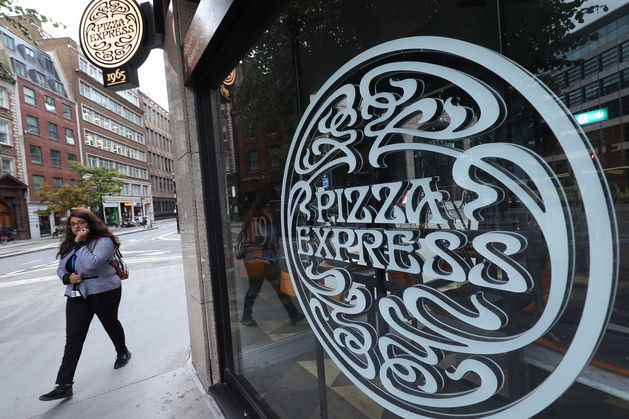A branch of Pizza Express, which operates as Milano here, in the City of London, as the chain was downgraded by analysts who view the group’s cash flow as weak and capital structure as unsustainable. Photo: Getty
The debt rating of UK-based restaurant chain PizzaExpress, which operates the Milano brand in Ireland, was further downgraded by S&P Global Ratings as tight consumer purses and tough competition in the industry challenge management’s ability to turn the company around.
The group’s holding company Wheel Bidco Ltd was cut deeper into non investment grade, or junk, status because a slowing UK economy indicates growth prospects have decreased, which in turn will impact its ability to reduce its debt, the ratings company said.
The seller of dough balls and ‘Nduja calzones, like the broader British hospitality sector, has been grappling with higher costs from wages as well as sizable rent payments. That and other factors are likely to hurt earnings this year and next, the ratings company said, despite management’s plans to control costs and improve revenue.
“We view the group’s cash flow as weak and capital structure as unsustainable in the long term, absent unforeseen improvements in trading conditions,” S&P analysts led by Coco Yim wrote in a note.
S&P cut its own guidance for PizzaExpress’s adjusted earnings before interest, taxes, depreciation and amortisation to about £74m (€89m) in 2024 from a previous forecast of £85m. While it has adequate liquidity, the operator faces a maturity wall in 2026, when a £30m revolving credit facility and £335m bonds come due.
The firm’s free operating cash flow after leases “could be insufficient to refinance at potentially higher interest rates in the prevalent market conditions,” the analysts wrote. FOCF is a metric that shows net cash flow from operations minus capital expenditures.
“We continue to focus on our short and medium term plans,” a representative for the firm said in emailed comments to Bloomberg News. Performance remains ahead of competitors in the Italian casual dining segment, they added.
The firm’s rating was cut to CCC+ from B-, meaning it’s now seven steps into so-called junk territory.
The restaurant chain, which started in the 1960s, has had some challenging years. Former creditors including Bain Capital Credit, Cyrus Capital Partners and HIG Bayside Capital took over the business in 2020, as part of a restructuring which saw Chinese private equity firm Hony Capital hand over the keys of the business outside of China.

